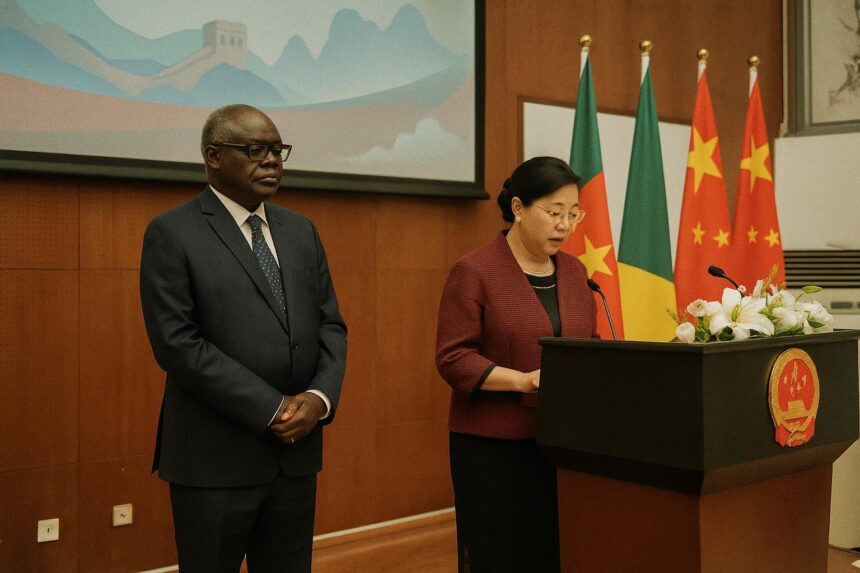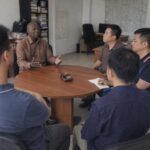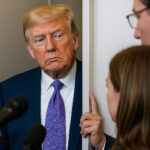Heralding a Milestone under Brazzaville’s Skies
The 98th anniversary of the People’s Liberation Army might have appeared a routine ceremonial date, yet the reception recently staged at Brazzaville’s riverside residence of Ambassador An Qing provided a revealing tableau of the shifting geometry of power on the Congo River. With Defence Minister Charles Richard Mondjo standing in for the Congolese government and a phalanx of regional envoys in attendance, the diplomat’s address emphasised what she called the “exceptional fraternity” between the two states. The carefully calibrated rhetoric echoed Beijing’s broader messaging in Central Africa—part celebration of past engineering landmarks, part promise of technology-driven modernisation still to come.
- Heralding a Milestone under Brazzaville’s Skies
- Economic Corridors Beyond Copper and Crude
- Diplomatic Synchrony and the FOCAC Copresidency
- Security Dialogue and the Soft Power of Medicine
- Cultural Interface: Language, Media and Digital Silk
- Navigating Debt Optics and Sovereign Agency
- Prospects for a Multipolar, Green-Tinged Pact
- A Partnership of Measured Ambition
Economic Corridors Beyond Copper and Crude
China has retained its position as Congo’s largest trading partner since 2012, accounting for almost 45 percent of Brazzaville’s merchandise exports last year, according to UN Comtrade estimates. While crude oil continues to dominate the ledger, joint commissions are quietly mapping diversification into timber processing, agri-business and cloud-based logistics. The Joint Declaration signed in June on a Development-Centred Economic Partnership, the first of its kind between Beijing and an African capital, provides tariff preferences and customs facilitation meant to shield investors from commodity price volatility (Ministry of Commerce PRC, July 2023). Congolese officials hope the framework will accelerate the special economic zones of Pointe-Noire and Ouesso, where early-stage Chinese ventures in lithium and timber derivatives are already visible.
Diplomatic Synchrony and the FOCAC Copresidency
Brazzaville’s assumption of the rotating African co-chair of the Forum on China-Africa Cooperation gives President Denis Sassou Nguesso an enlarged diplomatic megaphone precisely when multilateral financing norms are under scrutiny. Congolese negotiators are preparing a policy brief on debt sustainability mechanisms tailored to middle-income oil producers, banking on Beijing’s recent endorsement of the Common Framework managed by the G-20 and the Paris Club. In private conversations, Chinese diplomats concede that the Congolese portfolio offers an opportunity to test blended finance instruments that could later be replicated in Cameroon or Gabon. Such experimentation places the Central African state at the heart of ongoing debates on south-south governance.
Security Dialogue and the Soft Power of Medicine
Military cooperation, though discreet, has edged beyond protocol. Over the past five years more than sixty senior Congolese officers have attended command courses in Nanjing or Shijiazhuang, while People’s Liberation Army instructors have contributed to humanitarian de-mining near the Cabinda corridor, according to the Congolese Ministry of Defence. Yet the most tangible symbol of strategic empathy remains the hospital ship Peace Ark, which twice docked in Pointe-Noire to deliver free surgeries and tele-medicine training. Analysts at the Stockholm International Peace Research Institute note that such medical diplomacy not only wins hearts but also facilitates inter-operability for maritime search-and-rescue—an asset for Congo’s forthcoming offshore gas projects.
Cultural Interface: Language, Media and Digital Silk
Confucius Institutes in Brazzaville and Dolisie now enroll more than 2 000 students, a figure that has tripled since 2018. Meanwhile, the Congolese National Radio-Television debuted a Mandarin news segment in April, underscoring a media convergence that both capitals deem essential for what Ambassador An Qing termed a “community of shared narrative”. On the digital front, a third-generation fibre loop financed by the Export-Import Bank of China is scheduled to come online in early 2025, promising latency reductions critical to fintech start-ups. Observers at the Economic Commission for Africa suggest that such infrastructure could position Congo as a regional data transit hub, complementing its traditional role as an oil exporter.
Navigating Debt Optics and Sovereign Agency
The arithmetic of debt inevitably shadows any discussion of Chinese capital in Africa. Brazzaville’s public liabilities to Beijing stand at roughly 2.4 billion USD, or 16 percent of GDP, following a 2021 restructuring package that lengthened maturities to 2043 (IMF Article IV, 2022). Government insiders stress that the new Development Partnership embeds a joint monitoring committee intended to avert repayment bottlenecks. Western credit-rating agencies remain cautious, yet the administration argues that Chinese-financed hydro and transport assets are already generating service revenue sufficient to meet coupon obligations. For now, markets appear to agree: Congo’s Eurobond yield narrowed by 80 basis points in the quarter that followed the June accord.
Prospects for a Multipolar, Green-Tinged Pact
As climate diplomacy intensifies ahead of COP 28, Brazzaville is urging its partners to link carbon sequestration in the Cuvette Centrale peatlands with concessional lines for renewable energy. In that vein, Sinohydro engineers have completed feasibility studies for a 600-MW solar farm near Djambala, while the Chinese Academy of Forestry is co-funding satellite monitoring of Congo Basin emissions. Such threads weave seamlessly into Beijing’s Global Development Initiative, providing what Congolese Foreign Minister Jean-Claude Gakosso describes as “a convergence of ecological wisdom and pragmatic financing”.
A Partnership of Measured Ambition
The pageantry of diplomatic receptions can mask complex negotiations, yet the signals emanating from Brazzaville suggest a relationship maturing rather than merely enlarging. By nesting infrastructure, security and cultural ventures inside a formalised economic partnership, both capitals appear determined to cushion external shocks while amplifying mutual leverage. Whether the strategy delivers inclusive growth will hinge on domestic governance and market absorption, but for now the Sino-Congolese accord offers a case study in how mid-sized African states can navigate an increasingly multipolar order without forfeiting sovereign agency.





















